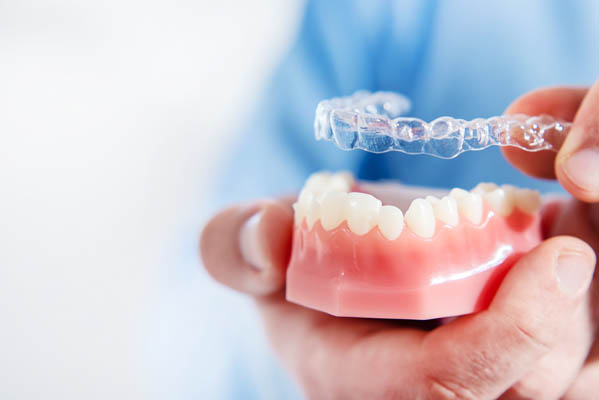Does Invisalign Really Work Without Causing Tooth Problems?

Are you thinking about getting Invisalign and wondering: Does Invisalign really work? Invisalign® is one of the most popular forms of clear aligner treatment. However, determining whether or not Invisalign really works is important if you are considering treatment. A common question is whether Invisalign causes any tooth problems, and we seek to answer that question in this review.
Determining whether Invisalign really works
The first step to determining whether Invisalign is right for you is to learn more about the treatment process and potential risks involved. The following is a complete review of whether or not Invisalign really works, including insights into who should consider Invisalign, potential risks, and how to prevent complications during treatment.
A review of Invisalign treatment
Invisalign uses clear aligners, which are transparent trays that pull teeth into ideal alignment. General dentists and orthodontists are qualified to carry out the treatment process. The process involves determining whether they are the best option for the patient, customizing the clear aligners, wearing the aligners for 20 to 22 hours each day (they are removable), and wearing a retainer after treatment is over to keep a straight smile in the long term.
Who should consider Invisalign?
Anyone who is not happy with how they look while smiling due to a misalignment of their teeth or jaw should consider orthodontic treatment. However, Invisalign is typically most appropriate for patients who have minor to moderate misalignments, and it may not be the best option for fixing more severe concerns. Generally speaking, Invisalign can address these issues:
- Teeth that are crooked
- Gaps between teeth
- Teeth that are overcrowded
- Jaw misalignments (i.e. underbite)
During a consultation visit with an Invisalign provider, the dental professional can explain the pros and cons of treatment and help you make an informed decision as to whether to start the Invisalign treatment process.
Potential risks with Invisalign
There are typically no serious threats to a patient’s dental health during Invisalign treatment, especially if they follow the treatment plan properly and protect teeth through good oral hygiene. However, if the patient fails to keep their clear aligners cleaned and rinsed off, then food particles and bacteria can get trapped between teeth and the aligners, which can increase the risk of tooth stains, dental cavities, and other oral health concerns.
How to prevent tooth problems during Invisalign treatment
Oral health concerns can develop if the patient does not care for their teeth properly through good oral hygiene. In addition to keeping the aligners clean, patients should also follow a consistent and thorough brushing and mouthwash routine, along with reducing the consumption of foods that may contribute to poor oral health, such as coffee, tea, soft drinks, and foods that are high in sugar.
Find out more about Invisalign
Our team helps patients through the entire Invisalign treatment process, from the initial consultation to ensuring the patient can keep their smile straight in the long term through aftercare and by wearing a retainer. If you would like to learn more about whether Invisalign really works, contact us today to arrange an initial visit.
Request an appointment here: https://drjosephmurray.com or call J.D. Murray DDS & Associates at (404) 410-2526 for an appointment in our East Point office.
Check out what others are saying about our dental services on Yelp: Does Invisalign Really Work in East Point, GA.
Recent Posts
An Invisalign dentist helps people who have teeth alignment issues. Many of these folks are turned off by the idea of having conspicuous metal braces in their mouth, and that prevents them from getting the treatment they need. Many would rather live with poorly aligned teeth than endure the attention braces draw to a person's…
The need for relining your dentures may not occur to you because of your busy schedule. But being aware of it can help you get relining services in time. Relining these restorations can help maintain your oral health and prevent discomfort. Here are the three signs you need to get relining services right away. Inspecting…
Full and partial dentures are two types of dental appliances that can improve your smile and ability to eat and speak clearly. While they look similar on the outside, they are very different in design and function. Read on to learn more about the differences between these two types of dentures and what you can…
Dentures can restore confidence in one’s smile and quality of life for those who have suffered tooth loss. However, it may not happen overnight, and getting used to dentures will take some time. Still, many denture wearers find the benefits of dentures are worth the wait. Though it may take some time to acclimate to…


